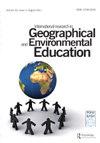走向强大的知识:澳大利亚未来教师可持续发展教育知识和倾向的案例研究
IF 3.1
Q2 EDUCATION & EDUCATIONAL RESEARCH
International Research in Geographical and Environmental Education
Pub Date : 2022-11-16
DOI:10.1080/10382046.2022.2146836
引用次数: 3
摘要
摘要为学校教师做准备不仅仅是让他们掌握课程、教育学的工具性知识,以及如何在实践中实施这些知识的经验。他们必须准备好理解并涵盖正义、公平和可持续性等令人信服的社会问题。要做到这一点,他们需要将紧迫的环境问题作为将可持续性纳入教学的先导。本文使用来自136名澳大利亚职前教师样本的调查数据来衡量他们对可持续性的知识和信念,以及他们的关注程度和教学意愿,了解不可持续做法的后果、能源使用的影响及其作为气候变化原因之一的贡献。一些人对气候变化的原因也有误解。大多数未来的教师都准备通过个人行动、在学校社区内进行教学和宣传来采取行动保护地球系统,而不太可能在学校之外进行政治活动。该样本的结果用于提出一个挑战,即在教师准备计划中,将强大知识的概念与日常知识结合起来,以改进可持续性教学,从而利用他们的潜力为可持续发展教育做出贡献。本文章由计算机程序翻译,如有差异,请以英文原文为准。
Towards powerful knowledge: an Australian case study of prospective teachers’ knowledge and dispositions for sustainability education
Abstract Preparing school teachers goes beyond equipping them with instrumental knowledge of curriculum, pedagogy, and experiences of how this can be enacted in practice. They must be prepared to understand and encompass compelling social issues of justice, equity, and sustainability. To do this they need to understand pressing environmental issues as a forerunner to incorporate sustainability into their teaching. This paper uses survey data from a sample of 136 Australian pre-service teachers to gauge their knowledge and beliefs about sustainability, as well as their level of concern and their inclination to teach about it. The results show sound levels of knowledge of the biophysical environment, knowledge about the consequences of unsustainable practices and the effects of energy use and its contribution as one cause of climate change. Some also hold misconceptions about the causes of climate change. Most prospective teachers are ready to take action to protect earth systems through personal actions, and teaching and advocating within their school community, and less likely to undertake political activities beyond the school. Results from this sample are used to set out a challenge to use the concept of powerful knowledge in tandem with everyday knowledge to improve sustainability instruction in teachers’ preparation programs to capitalise on their potential to contribute to Education for Sustainable Development.
求助全文
通过发布文献求助,成功后即可免费获取论文全文。
去求助
来源期刊

International Research in Geographical and Environmental Education
EDUCATION & EDUCATIONAL RESEARCH-
CiteScore
5.20
自引率
33.30%
发文量
11
期刊介绍:
International Research in Geographical & Environmental Education publishes quality research studies within the context of geographical and environmental education. The journal endeavours to promote international interest and dissemination of research in the field, provides a forum for critique, and demonstrates the relevance of research studies to good professional practice.
 求助内容:
求助内容: 应助结果提醒方式:
应助结果提醒方式:


